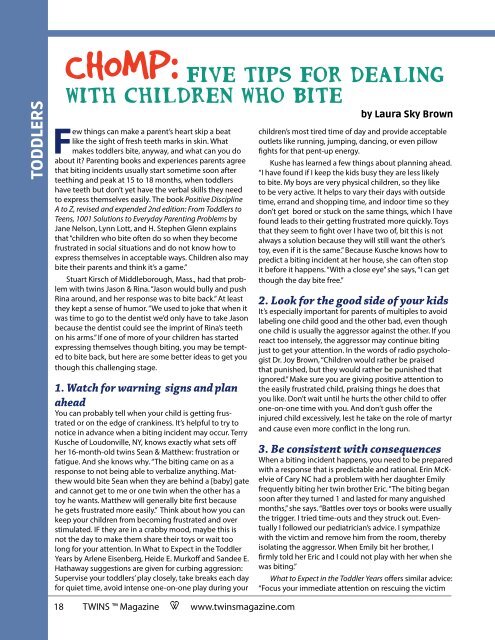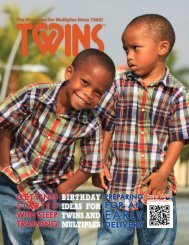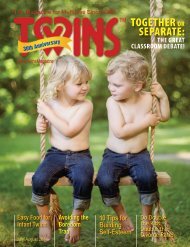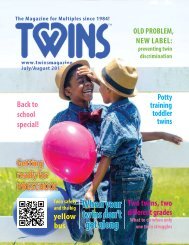TWINS - February 2018
Create successful ePaper yourself
Turn your PDF publications into a flip-book with our unique Google optimized e-Paper software.
TODDLERS<br />
CHOMP: Five tips for dealing<br />
with children who bite<br />
Few things can make a parent’s heart skip a beat<br />
like the sight of fresh teeth marks in skin. What<br />
makes toddlers bite, anyway, and what can you do<br />
about it? Parenting books and experiences parents agree<br />
that biting incidents usually start sometime soon after<br />
teething and peak at 15 to 18 months, when toddlers<br />
have teeth but don’t yet have the verbal skills they need<br />
to express themselves easily. The book Positive Discipline<br />
A to Z, revised and expended 2nd edition: From Toddlers to<br />
Teens, 1001 Solutions to Everyday Parenting Problems by<br />
Jane Nelson, Lynn Lott, and H. Stephen Glenn explains<br />
that “children who bite often do so when they become<br />
frustrated in social situations and do not know how to<br />
express themselves in acceptable ways. Children also may<br />
bite their parents and think it’s a game.”<br />
Stuart Kirsch of Middleborough, Mass., had that problem<br />
with twins Jason & Rina. “Jason would bully and push<br />
Rina around, and her response was to bite back.” At least<br />
they kept a sense of humor. “We used to joke that when it<br />
was time to go to the dentist we’d only have to take Jason<br />
because the dentist could see the imprint of Rina’s teeth<br />
on his arms.” If one of more of your children has started<br />
expressing themselves though biting, you may be tempted<br />
to bite back, but here are some better ideas to get you<br />
though this challenging stage.<br />
1. Watch for warning signs and plan<br />
ahead<br />
You can probably tell when your child is getting frustrated<br />
or on the edge of crankiness. It’s helpful to try to<br />
notice in advance when a biting incident may occur. Terry<br />
Kusche of Loudonville, NY, knows exactly what sets off<br />
her 16-month-old twins Sean & Matthew: frustration or<br />
fatigue. And she knows why. “The biting came on as a<br />
response to not being able to verbalize anything. Matthew<br />
would bite Sean when they are behind a [baby] gate<br />
and cannot get to me or one twin when the other has a<br />
toy he wants. Matthew will generally bite first because<br />
he gets frustrated more easily.” Think about how you can<br />
keep your children from becoming frustrated and over<br />
stimulated. IF they are in a crabby mood, maybe this is<br />
not the day to make them share their toys or wait too<br />
long for your attention. In What to Expect in the Toddler<br />
Years by Arlene Eisenberg, Heide E. Murkoff and Sandee E.<br />
Hathaway suggestions are given for curbing aggression:<br />
Supervise your toddlers’ play closely, take breaks each day<br />
for quiet time, avoid intense one-on-one play during your<br />
by Laura Sky Brown<br />
children’s most tired time of day and provide acceptable<br />
outlets like running, jumping, dancing, or even pillow<br />
fights for that pent-up energy.<br />
Kushe has learned a few things about planning ahead.<br />
“I have found if I keep the kids busy they are less likely<br />
to bite. My boys are very physical children, so they like<br />
to be very active. It helps to vary their days with outside<br />
time, errand and shopping time, and indoor time so they<br />
don’t get bored or stuck on the same things, which I have<br />
found leads to their getting frustrated more quickly. Toys<br />
that they seem to fight over I have two of, bit this is not<br />
always a solution because they will still want the other’s<br />
toy, even if it is the same.” Because Kusche knows how to<br />
predict a biting incident at her house, she can often stop<br />
it before it happens. “With a close eye” she says, “I can get<br />
though the day bite free.”<br />
2. Look for the good side of your kids<br />
It’s especially important for parents of multiples to avoid<br />
labeling one child good and the other bad, even though<br />
one child is usually the aggressor against the other. If you<br />
react too intensely, the aggressor may continue biting<br />
just to get your attention. In the words of radio psychologist<br />
Dr. Joy Brown, “Children would rather be praised<br />
that punished, but they would rather be punished that<br />
ignored.” Make sure you are giving positive attention to<br />
the easily frustrated child, praising things he does that<br />
you like. Don’t wait until he hurts the other child to offer<br />
one-on-one time with you. And don’t gush offer the<br />
injured child excessively, lest he take on the role of martyr<br />
and cause even more conflict in the long run.<br />
3. Be consistent with consequences<br />
When a biting incident happens, you need to be prepared<br />
with a response that is predictable and rational. Erin McKelvie<br />
of Cary NC had a problem with her daughter Emily<br />
frequently biting her twin brother Eric. “The biting began<br />
soon after they turned 1 and lasted for many anguished<br />
months,” she says. “Battles over toys or books were usually<br />
the trigger. I tried time-outs and they struck out. Eventually<br />
I followed our pediatrician’s advice. I sympathize<br />
with the victim and remove him from the room, thereby<br />
isolating the aggressor. When Emily bit her brother, I<br />
firmly told her Eric and I could not play with her when she<br />
was biting.”<br />
What to Expect in the Toddler Years offers similar advice:<br />
“Focus your immediate attention on rescuing the victim<br />
18 <strong>TWINS</strong> Magazine A www.twinsmagazine.com

















